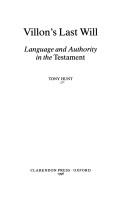Check nearby libraries
Buy this book

Villon studies have traditionally emphasized the documentary and didactic value of the Testament, concentrating on problems of historical referentiality. It is assumed that the work has a significant autobiographical element and that it has much to tell us about life in fifteenth-century Paris. The Testament has thus been avidly exploited by historians of the period and its interest as a document is well-established. There have, however, been few attempts to show why the text is interesting as literature.
Tony Hunt's present study concentrates exclusively on the textual strategies of the Testament, in particular on rhetorical techniques involving dialogue and irony.
Villon's Last Will views the Testament as ironic from start to finish, and the main objects of the irony are identified as language and authority. The dissolution of meaning, authority, and even authorial identity are seen to be the principal results of the poet's rhetoric. Tony Hunt's close reading of the text has produced a lively and well-informed commentary, full of fresh insights.
Check nearby libraries
Buy this book

| Edition | Availability |
|---|---|
|
1
Villon's last will: language and authority in the Testament
1996, Clarendon Press, Oxford University Press
in English
0198159145 9780198159148
|
aaaa
|
Book Details
Edition Notes
Includes bibliographical references (p. [154]-156) and indexes.
Classifications
The Physical Object
ID Numbers
Community Reviews (0)
History
- Created April 1, 2008
- 9 revisions
Wikipedia citation
×CloseCopy and paste this code into your Wikipedia page. Need help?
| August 1, 2024 | Edited by MARC Bot | import existing book |
| November 23, 2020 | Edited by MARC Bot | import existing book |
| October 10, 2020 | Edited by ImportBot | import existing book |
| August 4, 2020 | Edited by ImportBot | import existing book |
| April 1, 2008 | Created by an anonymous user | Imported from Scriblio MARC record |









